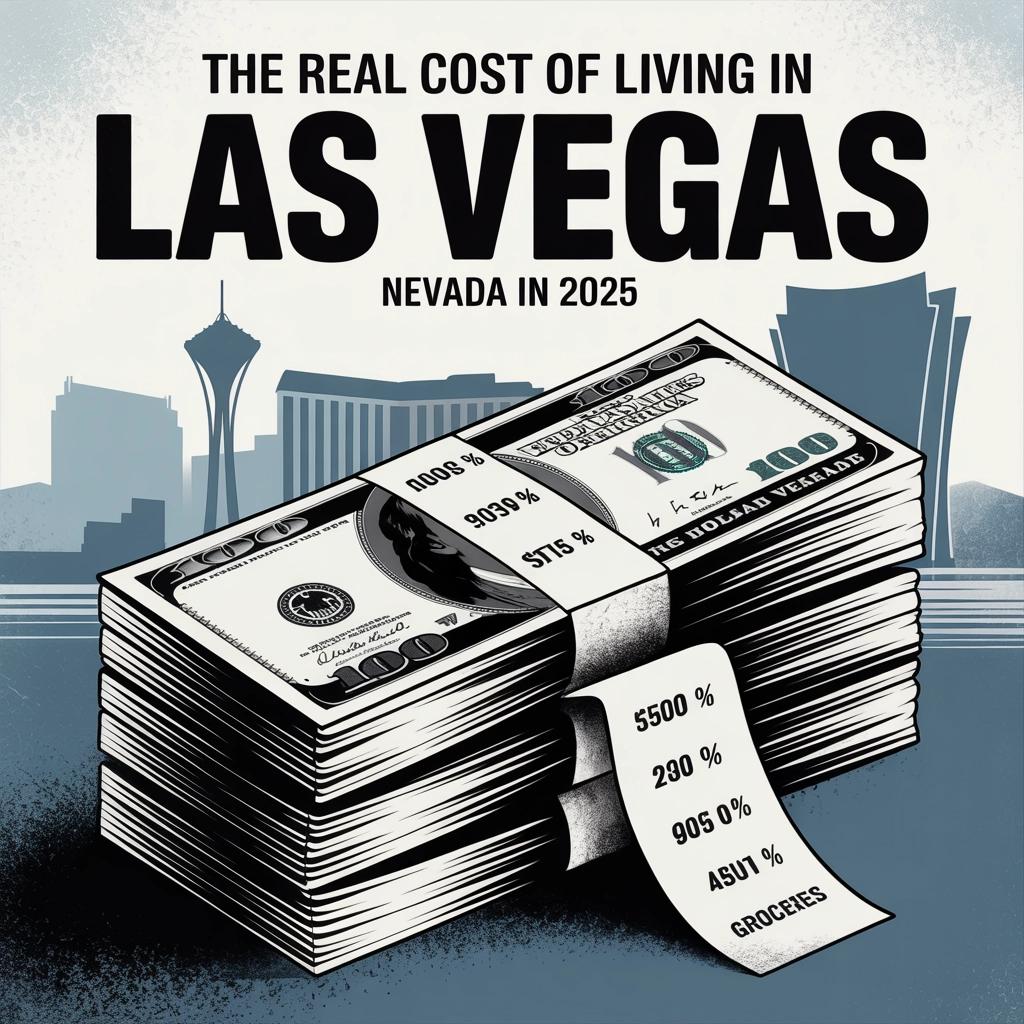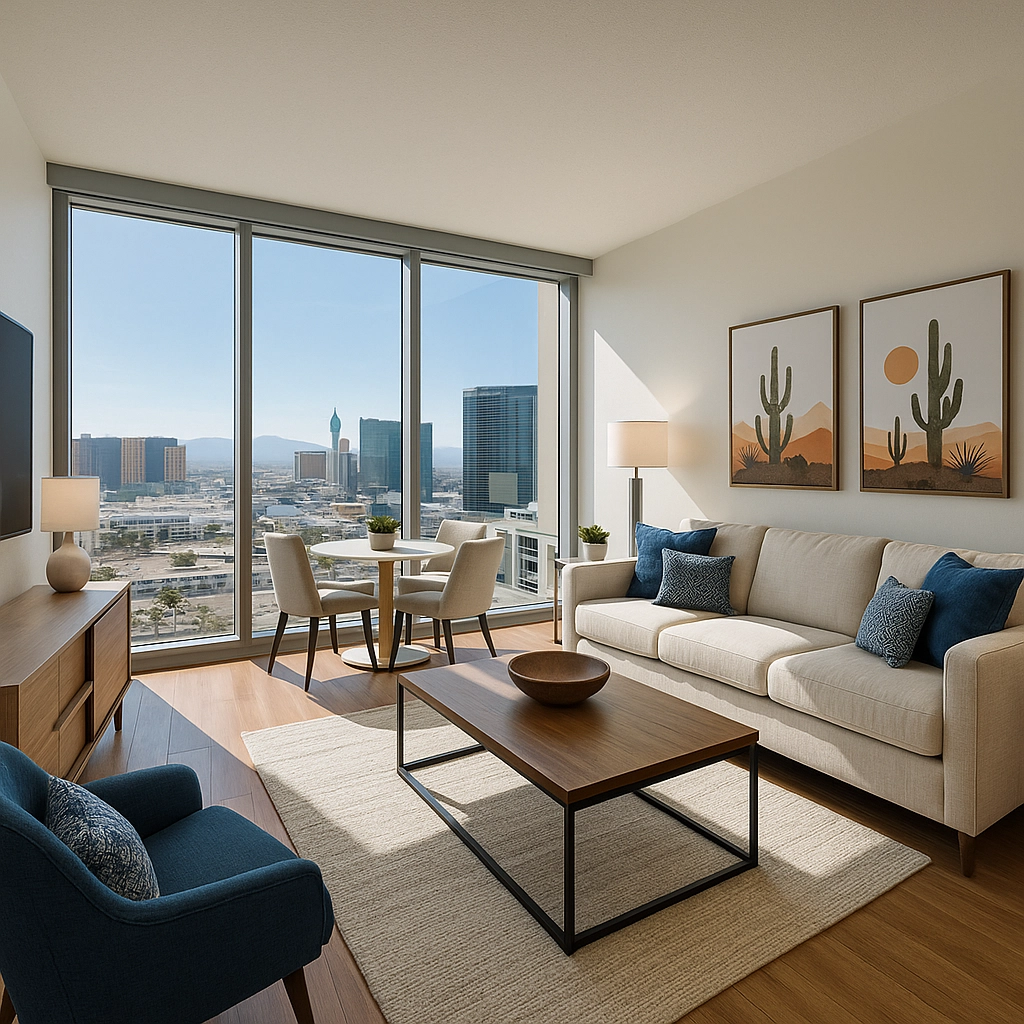Categories
RelocationPublished July 31, 2025
The REAL Cost of Living in Las Vegas Nevada in 2025

The REAL Cost of Living in Las Vegas Nevada in 2025
Beyond the Neon Lights: The True Cost of Vegas Living
Las Vegas has long been known for its dazzling casinos, world-class entertainment, and 24/7 lifestyle. But beneath the glitz and glamour lies a practical question many potential residents are asking: What does it actually cost to live in Las Vegas in 2025?
Whether you're considering a move from California, planning your retirement, or simply curious about life in the desert, this comprehensive breakdown will give you the unfiltered truth about Las Vegas living expenses.
Housing Costs: More Affordable Than You Might Think
Home Buying Market
The Las Vegas housing market in 2025 presents a surprisingly accessible entry point compared to other major Western cities. The median home price currently sits at $420,400, which, while not cheap, offers significantly more value than coastal markets like Los Angeles or San Francisco.
What makes homeownership particularly attractive in Las Vegas is Nevada's remarkably low property tax rate of just 0.59%. This translates to an average annual property tax bill of approximately $1,752 in Clark County—a fraction of what homeowners pay in many other states.
The market has stabilized since the wild fluctuations of previous years, making 2025 a more predictable time to buy. For more insights on current market conditions, check out our latest real estate trends analysis.
Rental Market
For those not ready to buy, the rental market offers varying options across the valley:
- Studio apartments: $950-$1,200/month
- 1-bedroom apartments: $1,100-$1,400/month
- 2-bedroom apartments: $1,300-$1,800/month
- 3-bedroom houses: $1,800-$2,500/month
The median rent across all property types falls between $1,397 and $1,706 per month, depending on location and amenities. Rental prices have remained relatively stable compared to 2024, with only a slight 0.1% increase year-over-year.

Monthly Expenses Breakdown
Utilities: Desert Living Considerations
Living in the desert comes with unique utility considerations. Here's what the average Las Vegas household can expect to pay monthly:
- Electricity: $130-$250 (highly seasonal due to air conditioning needs)
- Water: $50-$80 (conservation measures have helped stabilize costs)
- Natural gas: $30-$60
- Internet: $60-$100
- Phone service: $50-$90
- Trash service: $15-$25
Overall, utilities run about 8% higher than the national average, primarily due to cooling costs during the hot summer months. However, winter utility bills are typically lower than in colder regions, creating some annual balance.
Groceries and Food
Grocery costs in Las Vegas align closely with national averages, with a slight premium on fresh produce due to transportation costs. A typical monthly grocery bill for:
- Single adult: $350-$450
- Family of four: $900-$1,200
Dining out remains one of Vegas's pleasures, with options spanning from budget-friendly to extravagant:
- Quick service meal: $10-$15
- Mid-range restaurant dinner: $25-$40 per person
- High-end dining experience: $100+ per person
Pro tip: Many locals take advantage of casino dining specials and loyalty programs that can significantly reduce food costs.
Transportation Expenses
Las Vegas remains predominantly car-dependent, with transportation costs reflecting this reality:
- Average monthly car payment: $450-$650
- Auto insurance: $150-$225 monthly (Nevada has higher-than-average rates)
- Gasoline: $150-$200 monthly for average commuters
- Maintenance and registration: Approximately $75/month when averaged annually
Public transportation via the Regional Transportation Commission (RTC) offers bus service throughout the valley. A monthly pass costs $65, making it an economical option for those who can plan around the routes.
The Tax Advantage: Nevada's Secret Weapon
One of the most significant financial benefits of living in Las Vegas is Nevada's tax structure:
- No state income tax (potentially saving thousands annually)
- No inheritance tax
- No estate tax
- Relatively low property taxes (0.59% effective rate)
- Sales tax of 8.375% (slightly above the national average)
This favorable tax environment often offsets higher costs in other categories, particularly for high-income earners or retirees from high-tax states.

Healthcare Costs
Healthcare expenses represent a significant portion of most budgets. In Las Vegas:
- Health insurance premiums average $450-$650 monthly per person (employer plans typically reduce this substantially)
- Out-of-pocket maximums typically range from $4,000-$8,500 annually
- Primary care visit: $100-$200 without insurance
- Prescription medications: Comparable to national averages
The city has seen significant healthcare infrastructure growth, with major medical centers and specialized care facilities reducing the need to travel for treatment.
Education Expenses
For families with children, education costs factor heavily into budgeting:
- Public schools: Free (though expect to spend $300-$500 annually on supplies and activities)
- Private schools: $8,000-$15,000 per year tuition
- Preschool/daycare: $800-$1,200 monthly
- College: UNLV in-state tuition runs approximately $8,900 annually (plus fees and books)
Entertainment: The Vegas Lifestyle
Living in the entertainment capital offers unique opportunities and expenses:
- Local resident discounts are abundant for shows and attractions
- Many casinos offer free entertainment options
- Outdoor recreation at nearby national parks and recreation areas provides low-cost alternatives
- Annual passes to attractions offer significant savings for residents
Residents typically spend between $200-$500 monthly on entertainment, though this varies widely based on personal preferences.
Total Monthly Budget
Putting it all together, here's what Las Vegas residents can expect to spend monthly:
- Single adult: $2,800-$3,800
- Couple: $4,000-$5,200
- Family of four: $5,500-$7,500
These figures align with data showing the average Las Vegas resident spends approximately $4,546 per month on total living expenses, though more conservative lifestyles can reduce this to around $2,985 for a single person.
Comparative Value
To put Las Vegas's affordability in perspective:
- Living in Las Vegas with $5,890 provides the same lifestyle quality as $11,000 would in New York City
- Las Vegas is 4% cheaper than the rest of Nevada
- Housing costs are 6% higher than the national average, but this is offset by tax advantages and lower costs in other categories

Income Requirements
The median household income in Las Vegas is $66,356, providing a comfortable lifestyle for most families. Income varies by age and industry:
- Workers aged 24-44 earn a median of $63,603
- Those aged 45-64 earn a median of $71,873
The highest-paying sectors include healthcare, technology, legal services, business management, and engineering—all growing areas in the diversifying Las Vegas economy.
The Bottom Line: Is Las Vegas Affordable?
With a cost-of-living index of 101.3 (just slightly above the national average), Las Vegas offers an attractive balance of affordability and amenities. When factoring in the tax advantages, the value proposition becomes even stronger for many households.
The city presents a particularly compelling case for:
- Retirees from high-tax states
- Remote workers seeking affordable housing with urban amenities
- Families looking for reasonably priced homes in master-planned communities
- Professionals in growing sectors like healthcare, technology, and hospitality
Planning Your Move to Las Vegas?
If you're considering making Las Vegas your home, understanding these cost factors is just the beginning. Neighborhood selection, proximity to work, and lifestyle preferences all play crucial roles in your ultimate satisfaction.
At Finding Home Las Vegas, we specialize in helping newcomers navigate not just the housing market, but the entire lifestyle transition. For a personalized assessment of what your life in Las Vegas might cost—and which neighborhoods might best fit your budget and preferences—connect with our team today.
Want more insights on Las Vegas living? Check out our guide on relocating to Las Vegas in 2025 or explore neighborhood comparisons to find your perfect fit in the valley.

.jpg)




